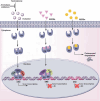Sex hormones and immune regulation in ovarian cancer
- PMID: 39738765
- PMCID: PMC11688266
- DOI: 10.1007/s12672-024-01675-w
Sex hormones and immune regulation in ovarian cancer
Abstract
Ovarian cancer continues to be a major cause of morbidity and mortality in women, with immune regulation playing a critical role in its progression and treatment response. This review explores the interplay between sex hormones, particularly estrogen and progesterone, and immune regulation in ovarian cancer. We delve into the mechanisms by which these hormones influence immune cell function, modulate immune checkpoints, and alter the tumor microenvironment. Key pathways involving estrogen and progesterone receptors are examined, highlighting their impact on tumor growth and immune evasion. The review also discusses the therapeutic implications of these interactions, including the potential for combining hormone-based therapies with immune checkpoint inhibitors. Personalized medicine approaches, leveraging biomarkers for predicting treatment response, are considered essential for optimizing patient outcomes. Finally, we address current research gaps and future directions, emphasizing the need for advanced research technologies and novel therapeutic strategies to improve the treatment of ovarian cancer through a better understanding of hormone-immune interactions.
Keywords: Estrogen; Immune regulation; Ovarian cancer; Progesterone; Sex hormones.
© 2025. The Author(s).
Conflict of interest statement
Declarations. Competing interests: The authors declare no competing interests.
Figures


References
Publication types
Grants and funding
LinkOut - more resources
Full Text Sources
